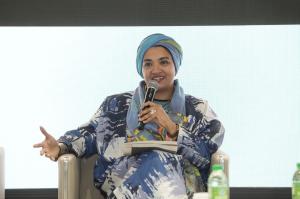
World Future Energy Summit Closes with Spotlight on Sustainable City Resilience and Green Finance
As part of the final day, a Sustainable Cities Conference looked at extreme climate events and how urban planners can better prepare for them. With the ongoing wildfires in California causing an estimated US$160-200 billion in damages and this week’s World Future Energy Summit the first since devastating floods left US$850 million in damage across the Gulf, a panel of sustainability experts discussed the economic benefits of investing in climate risk assessments during the design process and highlighted the need for proactivity over reactivity.
Moderated by Dima Al Srouri, Founder of Biospheric City Lab, attendees heard how developers can reap the long-term rewards of early investment. “The European Union has estimated that for every euro you spend on risk management, you actually save six euros in avoidance of catastrophes and damages,” said Al Srouri. “So we need to take a longer-term approach when we think about these risks. We're not working for something that may happen next year; we're working for the next generation – for the next 50 years.”
Farah Naz, Director of ESG and Innovation at Aecom, added: “We don’t ask ‘What If?’ anymore because there is always this question of value engineering. But are we creating value when we have US$850m of damages and stranded assets? We are in the midst of a climate and biodiversity emergency, so we really need to start reimagining and converting those reimagination points into business studies and case studies and drive that conversation of climate, economy, and society together.”
Earlier in the day, a packed hall heard Alida Saleh, Head of Sustainability at JLL MEA, urge for more accessible rhetoric. A senior advisor of the Built Environment Climate Champions Team and speaking as part of a session focused on self-sufficient cities and whether they are an unachievable dream, Saleh stressed the need to explain the issues and actions required in a way that everybody can understand.
“We have to change the way we are,” she said. “The estimate is that we use approximately 30 litres of water to brush our teeth for two minutes. If 6,000 of us decided to turn off the tap between brushes, our savings of water would be almost 26 Olympic-sized swimming pools – from a one-day behavioural change. We need to break things down to a level where every action has an impact… We often speak in a language that doesn't allow people to feel engaged. Let's talk instead in a language that brings people together because the power of collective action is a lot better than working individually.”
With water scarcity an ongoing environmental issue, Baynunah Water Generation Technologies and Pipetec used the three-day Summit to announce a landmark strategic partnership that involves the first implementation of technology that can convert steam into pure drinking water. The innovation not only provides a solution to water scarcity but dramatically reduces the environmental impact of industrial operations.
“This partnership represents a significant milestone in our journey to innovate and combat water scarcity while reducing carbon emissions,” said Michael Rutman, CEO of Baynunah Watergeneration Technologies. “By leveraging Ma Hawa’s groundbreaking technology, we are taking a crucial step towards creating a more sustainable future for generations to come.”
Green Financing provides huge investment opportunities
According to a report by the Global Governance Project, the transition to a low-carbon energy future for emerging economies, excluding China, will require a total annual investment of approximately US$1 trillion by the end of this year and US$2.4trn by 2030. Achieving a just transition is complex and requires a comprehensive approach that balances social, economic, and environmental considerations, the report said.
The opening panel of the one-day Green Finance Conference looked at the recent surge in demand for green assets, driven by environmental, social, and governance (ESG) considerations. Almost every bank seeks to invest in sustainable projects, leading to a decrease in scarcity value, but despite this demand, there is still no significant pricing advantage for green financing.
Bart White, Managing Director of EMEA and Head of Energy and Structured Finance at Santander, identified the availability of capital to start-ups and how high interest rates are market-determined and not necessarily a barrier to green finance. “The premium that banks or investors need to charge for renewable energy is actually in a great place. When we compare renewable energy to, for instance, data centres, it’s already very tight. Data centres are in huge demand and the advent of AI means we'll be consuming incrementally more data in the future, so they should be hugely investable, yet they’re still trailing in terms of active financing versus renewables.”
The discussion shifted to the availability of capital to help drive innovation, startups and new technology. According to White, we’re in an exciting era of innovation, and so many new businesses need access to capital, which is the lifeblood of a startup. “I think the focus should really be on how can we deliver enough financing to ensure that good, realistic prospects and the right technology companies with the right science also get the correct financing to help deliver that next chapter of decarbonisation across the globe.”
The World Future Energy Summit 2025 has several strategic partners, including Masdar, Tadweer Group, Masdar City, Nextracker, DEWA, and Emirates Water and Electricity Company (EWEC).
Pragati Malik
MCS Action FZ LLC
email us here
Distribution channels: Business & Economy, Conferences & Trade Fairs, Energy Industry, Environment, Technology
Legal Disclaimer:
EIN Presswire provides this news content "as is" without warranty of any kind. We do not accept any responsibility or liability for the accuracy, content, images, videos, licenses, completeness, legality, or reliability of the information contained in this article. If you have any complaints or copyright issues related to this article, kindly contact the author above.
Submit your press release




